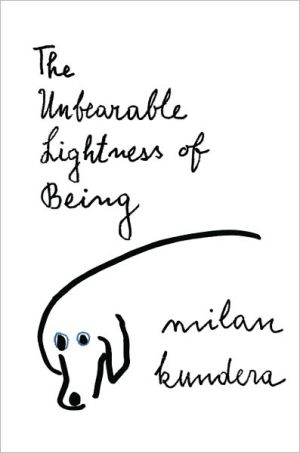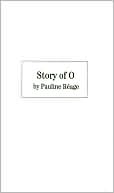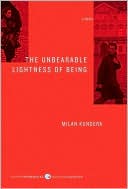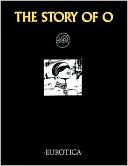Unbearable Lightness of Being
A young woman in love with a man torn between his love for her and his incorrigible womanizing; one of his mistresses and her humbly faithful lover—these are the two couples whose story is told in this masterful novel. In a world in which lives are shaped by irrevocable choices and by fortuitous events, a world in which everything occurs but once, existence seems to lose its substance, its weight. Hence, we feel "the unbearable lightness of being" not only as the consequence of our pristine...
Search in google:
A young woman in love with a man torn between his love for her and his incorrigible womanizing; one of his mistresses and her humbly faithful lover — these are the two couples whose story is told in this masterful novel. In a world in which lives are shaped by irrevocable choices and by fortuitous events, a world in which everything occurs but once, existence seems to lose its substance, its weight. Hence, we feel "the unbearable lightness of being" not only as the consequence of our pristine actions but also in the public sphere, and the two inevitably intertwine.Janet MalcolmBrilliant . . . A work of high modernist playfulness and deep pathos. —New York Review of Books
The Unbearable Lightness of Being\ A Novel \ One\ The idea of the eternal return is a mysterious one, and Nietzsche has often perplexed other philosophers with it: to think that everything recurs as we once experienced it, and that the recurrence itself recurs ad infinitum! What does this mad myth signify?\ Putting it negatively, the myth of eternal return states that a life which disappears once and for all, which does not return, is like a shadow, without weight, dead in advance, and whether it was horrible, beautiful, or sublime, its horror, sublimity, and beauty mean nothing. We need take no more note of it than of a war between two African kingdoms in the fourteenth century, a war that altered nothing in the destiny of the world, even if a hundred thousand blacks perished in excruciating torment.\ Will the war between two African kingdoms in the fourteenth century itself be altered if it recurs again and again, in eternal return?\ It will: it will become a solid mass, permanently protuberant, its inanity irreparable.\ If the French Revolution were to recur eternally, French historians would be less proud of Robespierre. But because they .deal with something that will not return, the bloody years of the Revolution have turned into mere words, theories, and discussions, have become lighter than feathers, frightening no one. There is an infinite difference between a Robespierre who occurs only once in history and a Robespierre who eternally returns, chopping off French heads.\ Let us therefore agree that the idea of eternal return implies a perspective from which things appear other than as we know them: theyappear without the mitigating circumstance of their transitory nature. This mitigating circumstance prevents us from coming to a verdict. For how can we condemn something that is ephemeral, in transit? In the sunset of dissolution, everything is illuminated by the aura of nostalgia, even the guillotine.\ Not long ago, I caught myself experiencing a most incredible sensation. Leafing through a book on Hitler, I was touched by some of his portraits: they reminded me of my childhood. I grew up during the war; several members of my family perished in Hitler's concentration camps; but what were their deaths compared with the memories of a lost period in my life, a period that would never return?\ This reconciliation with Hitler reveals the profound moral perversity of a world that rests essentially on the nonexistence of return, for in this world everything is pardoned in advance and therefore everything cynically permitted.\ \ Two\ \ \ If every second of our lives recurs an infinite number of times, we are nailed to eternity as Jesus Christ was nailed to the cross. It is a terrifying prospect. In the world of eternal return the weight of unbearable responsibility lies heavy on every move we make. That is why Nietzsche called the idea of eternal return the heaviest of burdens (das schwerste Gewicht).\ If eternal return is the heaviest of burdens, then our lives can stand out against it in all their splendid lightness.\ But is heaviness truly deplorable and lightness splendid?\ The heaviest of burdens crushes us, we sink beneath it, it pins us to the ground. But in the love poetry of every age, the woman longs to be weighed down by the man's body. The heaviest of burdens is therefore simultaneously an image of life's most intense fulfillment. The heavier the burden, the closer our lives come to the earth, the more real and truthful they become.\ Conversely, the absolute absence of a burden causes man to be lighter than air, to soar into the heights, take leave of the earth and his earthly being, and become only half real, his movements as free as they are insignificant.\ What then shall we choose? Weight or lightness?\ Parmenides posed this very question in the sixth century before Christ. He saw the world divided into pairs of opposites: light/darkness, fineness/coarseness, warmth/cold, being/nonbeing. One half of the opposition he called positive (light, fineness, warmth, being), the other negative. We might find this division into positive and negative poles childishly simple except for one difficulty: which one is positive, weight or lightness?\ Parmenides responded: lightness is positive, weight negative.\ Was he correct or not? That is the question. The only certainty is: the lightness/weight opposition is the most mysterious, most ambiguous of all.\ \ Three\ \ \ I have been thinking about Tomas for many years. But only in the light of these reflections did I see him clearly. I saw him standing at the window of his flat and looking across the courtyard at the opposite walls, not knowing what to do.\ He had first met Tereza about three weeks earlier in a small Czech town. They had spent scarcely an hour together. She had accompanied him to the station and waited with him until he boarded the train. Ten days later she paid him a visit. They made love the day she arrived. That night she came down with a fever and stayed a whole week in his flat with the flu.\ He had come to feel an inexplicable love for this all but complete stranger; she seemed a child to him, a child someone had put in a bulrush basket daubed with pitch and sent downstream for Tomas to fetch at the riverbank of his bed.\ She stayed with him a week, until she was well again, then went back to her town, some hundred and twenty-five miles from Prague. And then came the time I have just spoken of and see as the key to his life: Standing by the window, he looked out over the courtyard at the walls opposite him and deliberated.\ Should he call her back to Prague for good? He feared the responsibility. If he invited her to come, then come she would, and offer him up her life.\ Or should he refrain from approaching her? Then she would remain a waitress in a hotel restaurant of a provincial town and he would never see her again.\ The Unbearable Lightness of Being\ A Novel. Copyright © by Milan Kundera. Reprinted by permission of HarperCollins Publishers, Inc. All rights reserved. Available now wherever books are sold.
Part One Lightness and Weight 1Part Two Soul and Body 37 Part Three Words Misunderstood 79 Part Four Soul and Body 129 Part Five Lightness and Weight 173 Part Six The Grand March 241 Part Seven Karenin's Smile 279
\ Janet MalcolmBrilliant . . . A work of high modernist playfulness and deep pathos. —New York Review of Books\ \ \ \ \ Jim MillerKundera has raised the novel of ideas to a new level of dreamlike lyricism and emotional intensity. —Newsweek\ \ \ Elizabeth HardwickKundera is a virtuoso . . . A work of the boldest mastery, originality, and richness. —Vanity Fair\ \ \ \ \ People MagazineA meditation on life, on the erotic, on the nature of men and women and love...full of telling details, truths large and small.\ \ \ \ \ NewsweekKundera has raised the novel of ideas to a new level of dream-like lyricism and emotional intensity.\ \ \ \ \ Richard LockeThe Unbearable Lightness of Being is both a love story and a novel of ideas.... Witty, seductive, serious... also full of feeling and enormously experienced in the tricky interplay of sex and politics.... One of the finest and most consistently interesting novelists in Europe or America, [Kundera] has a powerful tale to tell. \ — The Washington Post Book World\ \ \ \ \ Edmund WhiteFew contemporary writers have succeeded as Kundera has in combining a cool, elegant, formal objectivity with warm, intimate (almost embarrassingly intimate) pictures of the imperfect realities of adult love. Kundera's heroes may be Don Juans, but they are shy, apologetic ones; his women are intensely physical beings, but they are also as quirkily intelligent and stubbornly independent as his men. \ — The Nation\ \ \ \ \ Frances TaliaferroA work of large scale and complexity, symphonically arranged... political and philosophical, erotic and spiritual, funny and profound.... There is no wiser observer now writing of the multifarious relations of men and women.... Kundera's intelligence is both speculative and playful. The Unbearable Lightness of Being is his best novel yet. \ — The Wall Street Journal\ \






